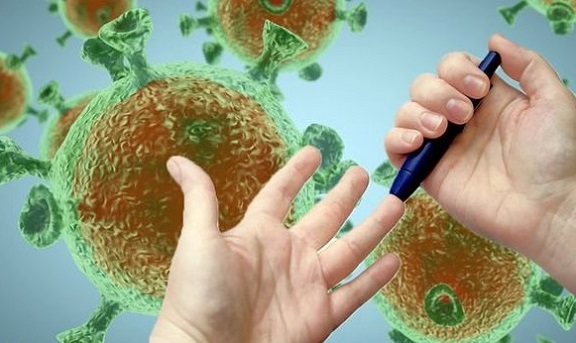High Blood Sugar Fuels Liver Infection by COVID-19 Virus and Glucose Drugs Could Help Reduce Risk
Nikhil Prasad Fact checked by:Thailand Medical News Team Jun 04, 2025 8 months, 2 weeks, 1 day, 11 hours, 54 minutes ago
Medical News: A Dangerous Link Between Blood Sugar and COVID-19 Infection
New research has uncovered a troubling connection between high blood sugar levels and increased vulnerability to liver infections by SARS-CoV-2, the virus responsible for COVID-19. Scientists from West China Hospital, Sichuan University and Gansu Provincial Hospital have demonstrated that hyperglycaemia—commonly seen in diabetes and metabolic diseases—can amplify the expression of viral entry factors specifically in liver cells, making them more susceptible to infection.
 High Blood Sugar Fuels Liver Infection by COVID-19 Virus and Glucose Drugs Could Help Reduce Risk
High Blood Sugar Fuels Liver Infection by COVID-19 Virus and Glucose Drugs Could Help Reduce Risk
In contrast, this
Medical News report notes that neither high insulin levels nor elevated fats in the blood had the same effect on viral entry. The team also showed that several glucose-lowering drugs, including metformin and dapagliflozin, can counteract this harmful effect by suppressing the expression of these viral gateways in liver cells.
Key Institutions Involved
The study was led by researchers from the Department of Endocrinology and Metabolism, Department of Biotherapy, and Center for Diabetes and Metabolism Research at the State Key Laboratory of Biotherapy and Cancer Center, West China Hospital, Sichuan University. Co-authors were also affiliated with the Gansu Provincial Hospital and the Division of Pulmonary and Critical Care Medicine at the same institution.
What the Study Found
The research team focused on how different metabolic conditions—namely high blood sugar (hyperglycaemia), high insulin (hyperinsulinaemia), and high fat levels (hyperlipidaemia)—affect the virus’s ability to enter human cells. They tested lung, pancreatic, and liver cells grown in lab conditions and treated them with varying levels of glucose, insulin, and fat.
Only high glucose levels led to a significant increase in the expression of several proteins that SARS-CoV-2 uses to enter cells: ACE2, TMPRSS2, TMPRSS4, FURIN, and NRP1. This upregulation occurred specifically in liver cells (HepG2 and Huh7 lines) and was confirmed at both RNA and protein levels. No such effect was seen in lung cells, and only a weak increase was observed in pancreatic cells.
To verify whether this increased protein expression led to greater infection, the scientists used a pseudovirus system—a lab-engineered virus mimicking SARS-CoV-2—to test how easily the virus could enter these liver cells. The results were striking. Liver cells exposed to high glucose became significantly more vulnerable to infection, with one liver cell line showing a tenfold increase in viral entry compared to normal glucose conditions.
How Glucose Drugs Come into Play
The researchers then tested whether four commonly used glucose-lowering drugs—metformin, dapagliflozin, sitagliptin, and exenatide—could reverse this effect. When liver cells were treated with these drugs under high-glucose
conditions, the viral entry was substantially reduced. Metformin and dapagliflozin were the most effective across both liver cell lines, and all four drugs suppressed the elevated expression of viral entry proteins.
Interestingly, these drugs had no significant effect on viral entry when used in cells under normal glucose conditions, suggesting that their benefits are specifically relevant in hyperglycaemic states.
Real Patient Tissues Confirm the Findings
To bridge the gap between lab findings and real-world relevance, the researchers examined liver tissue samples from patients with non-alcoholic fatty liver disease (NAFLD) and type 2 diabetes—both conditions associated with elevated blood sugar. These samples showed significantly higher levels of the same viral entry proteins, confirming that what was observed in lab-grown cells also occurs in actual human livers affected by metabolic disease.
The Role of mTOR and Molecular Mechanisms
The team also explored the molecular mechanisms involved and found that the mTOR pathway—a key nutrient-sensing system often linked to aging and disease—was partially responsible for the glucose-induced increase in entry proteins. Using rapamycin, a drug that blocks mTOR activity, they were able to reduce the expression of these proteins in liver cells, offering another potential therapeutic target.
Conclusion
This study provides the first clear evidence that high blood sugar levels can enhance the liver’s susceptibility to SARS-CoV-2 by increasing the expression of viral entry factors. It also shows that commonly available glucose-lowering medications can reduce this risk, potentially offering a way to protect individuals with diabetes or metabolic disorders from more severe forms of COVID-19. These findings not only explain why people with such conditions often experience worse COVID outcomes, but also highlight a new metabolic mechanism of viral infection. Importantly, this research offers hope for targeted preventive strategies using existing medications. Further studies are needed to confirm these findings in live human settings and to test whether these protective effects extend to newer variants of the virus.
The study findings were published in the peer reviewed Journal of Cellular and Molecular Medicine.
https://onlinelibrary.wiley.com/doi/10.1111/jcmm.70581
For the latest COVID-19 News, keep on logging to Thailand
Medical News
Read Also:
https://www.thailandmedical.news/news/metformin-as-a-potential-antiviral
https://www.thailandmedical.news/news/metformin-s-impact-on-immune-response-genes-and-gut-microbiota-in-covid-19-patients-with-type-2-diabetes
https://www.thailandmedical.news/news/covid-19-news-weill-cornell-study-finds-that-sars-cov-2-infects-and-triggers-senescence-of-dopamine-neurons-metformin-helps
https://www.thailandmedical.news/articles/coronavirus
https://www.thailandmedical.news/pages/thailand_doctors_listings
